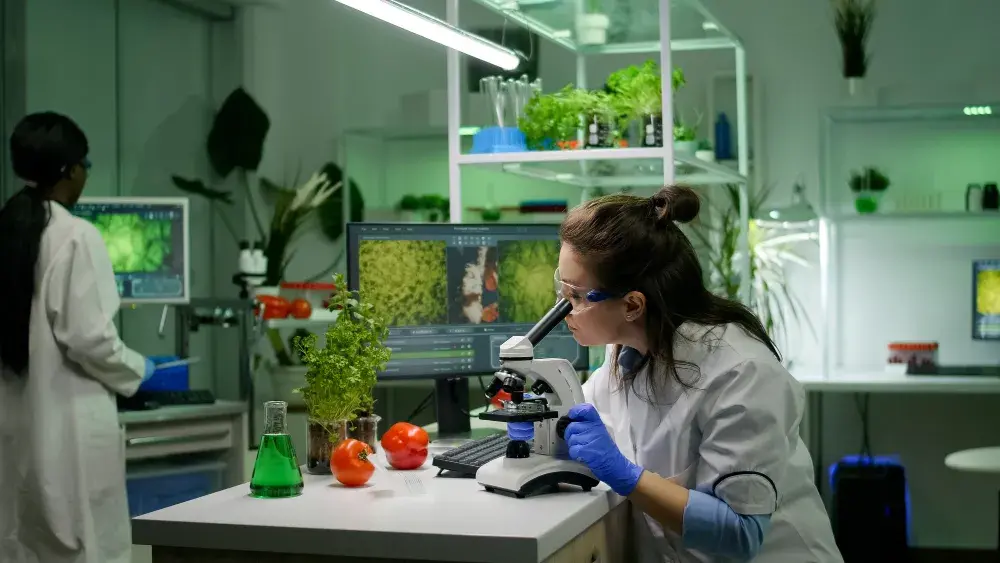- Blog
- March 18, 2025
Navigating the Future of Hiring in Food Manufacturing and R&D

- Blog
- March 18, 2025
Navigating the Future of Hiring in Food Manufacturing and R&D
Navigating the Future of Hiring in Food Manufacturing and R&D
The food industry is undergoing a transformative shift driven by rapid technological advancements, changing consumer demands, and increasingly complex regulatory frameworks. As food manufacturing and research & development (R&D) evolve, the need for skilled professionals grows stronger. Companies must rethink their talent acquisition strategies to stay competitive, ensuring they attract and retain the best minds to drive innovation and operational excellence.
In this dynamic environment, success lies in adopting new hiring strategies, fostering a culture of continuous learning, and positioning your business as a leader to secure the workforce of the future.
Emerging Hiring Trends in Food Manufacturing and R&D
The Growing Demand for Skilled Professionals in Food Manufacturing
Automation, AI, and robotics are revolutionizing food manufacturing, driving demand for experts who can optimize these advanced systems. Skilled professionals in robotics, industrial automation, and digital manufacturing are essential for boosting efficiency, cutting costs, and staying competitive. Meanwhile, stricter regulations are increasing the need for HACCP-certified specialists to uphold food safety and compliance.
To retain top talent, companies are enhancing benefits, improving work conditions, and investing in career development. These strategies not only attract skilled workers but also build loyalty, ensuring a stable and proficient workforce in a rapidly evolving industry.
R&D Expertise is in High Demand but Limited Supply
As consumer demand shifts toward healthier, sustainable, and innovative foods, the need for R&D experts is growing—but finding and retaining them remains a challenge. The rise of alternative proteins and functional foods has increased demand for specialists in plant-based proteins, fermentation technologies, and bioengineering, driving innovation in food science.
Sensory science and product development are also gaining importance, as consumers prioritize taste, texture, and nutrition. Additionally, sustainability is shaping new roles, with companies hiring sustainability officers, packaging engineers, and food waste reduction specialists to meet eco-conscious expectations.
Cross-Functional Skills Are Becoming Essential
Employers increasingly seek candidates who can bridge science, engineering, and business operations, making multidisciplinary expertise essential. Food scientists with market expansion knowledge are in high demand, as companies need experts in product scale-up and commercialization to accelerate innovation.
Engineers with industry-specific skills are crucial for optimizing production and ensuring operational excellence. Meanwhile, regulatory experts with global market insight are vital for navigating complex compliance requirements, enabling seamless international expansion.
Overcoming Labor Shortages and Hiring Challenges
Food manufacturers and R&D facilities face growing difficulties in securing skilled talent. An aging workforce is creating a knowledge gap, requiring immediate action through training and knowledge transfer programs. Meanwhile, competition from higher-paying industries like pharmaceuticals and biotechnology makes attracting top professionals even harder.
To stay competitive, companies must accelerate their hiring processes. In a fast-moving job market where, top candidates receive multiple offers, streamlining recruitment is essential to securing the best talent before they accept opportunities elsewhere.
Strategies for Effective Hiring in Food Manufacturing and R&D
- Strengthen Workforce Development: Companies must implement training and upskilling programs to attract candidates with transferable skills and ensure their workforce remains future-ready. Building partnerships with universities and technical schools can also help create a steady talent pipeline and foster early career development.
- Enhance Employer Branding: A strong employer brand is key to attracting top talent. Businesses should promote their company culture, career growth opportunities, and sustainability initiatives to appeal to mission-driven professionals. Highlighting the use of cutting-edge manufacturing and R&D technologies can also help attract tech-savvy candidates looking for opportunities in emerging fields.
- Utilize Specialized Hiring Solutions: Engaging industry-specific staffing firms can provide access to highly qualified candidates who may not be actively seeking new roles. Additionally, adopting flexible hiring models such as temporary-to-hire approaches allows companies to assess candidate performance before extending full-time offers.
- Accelerate the Hiring Process: Simplifying recruitment procedures can help companies secure top talent before competitors. Reducing lengthy interview and approval processes is crucial in today’s fast-moving job market. Offering competitive compensation packages and comprehensive benefits can also make a significant difference in attracting and retaining skilled professionals.
Final Thoughts
The future of hiring in food manufacturing and R&D is evolving rapidly. Companies that proactively address talent shortages, invest in workforce development, and adopt innovative hiring strategies will position themselves for long-term success.
At MSR Technologies, we help food manufacturing and R&D companies secure top-tier talent to drive innovation, ensure regulatory compliance, and enhance efficiency. Partner with us to build a skilled workforce that supports your company’s long-term success. Let’s talk about your hiring needs. Contact us today.




